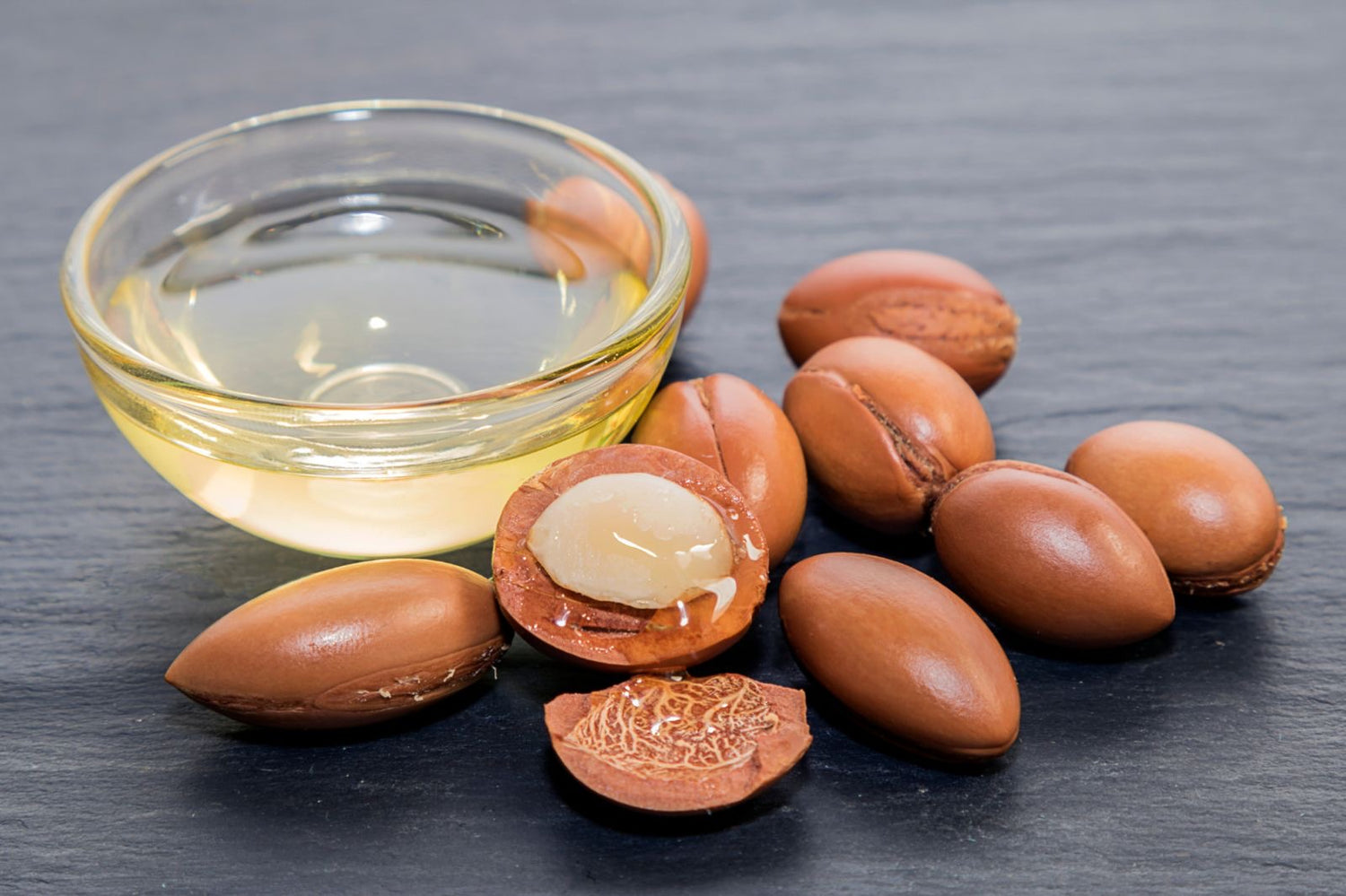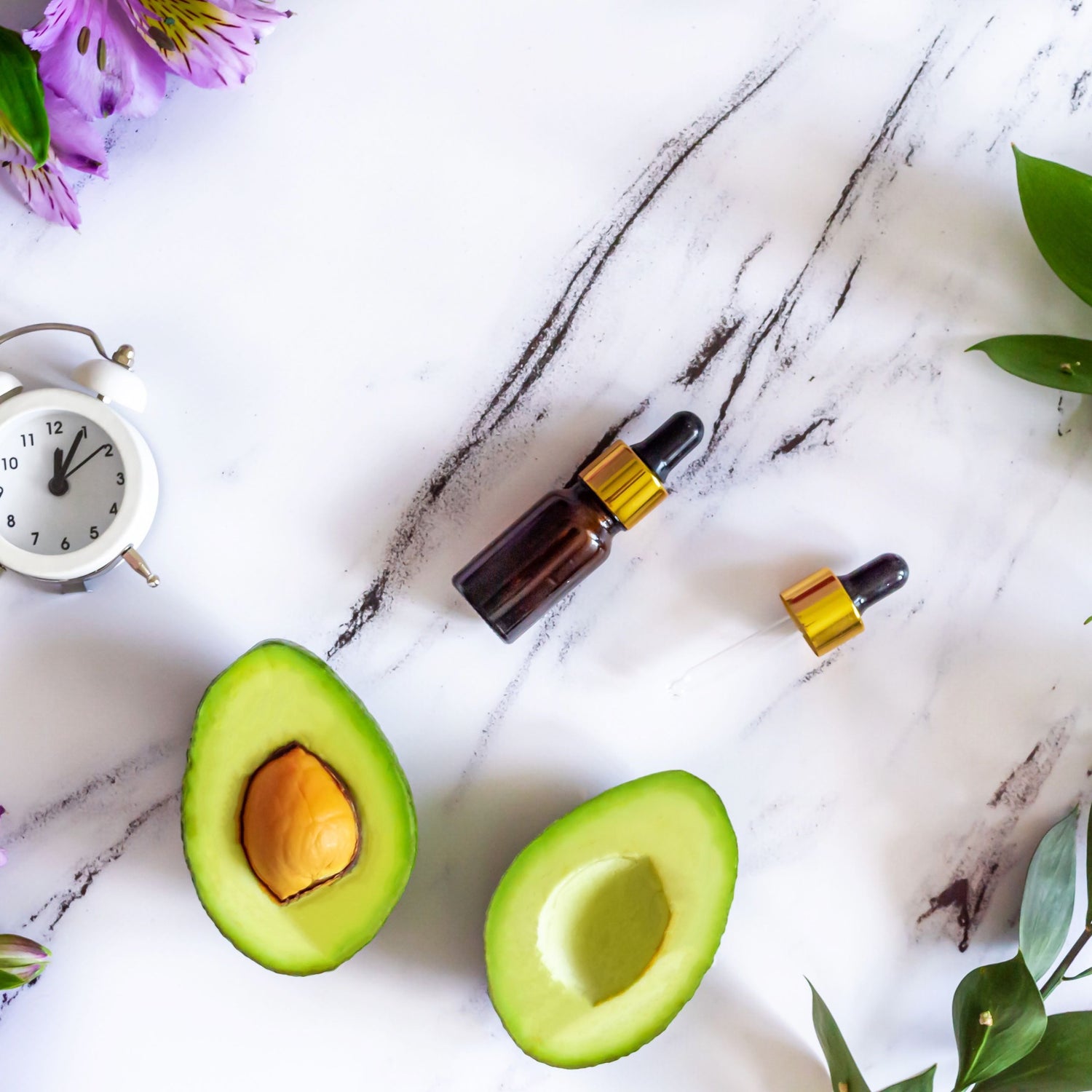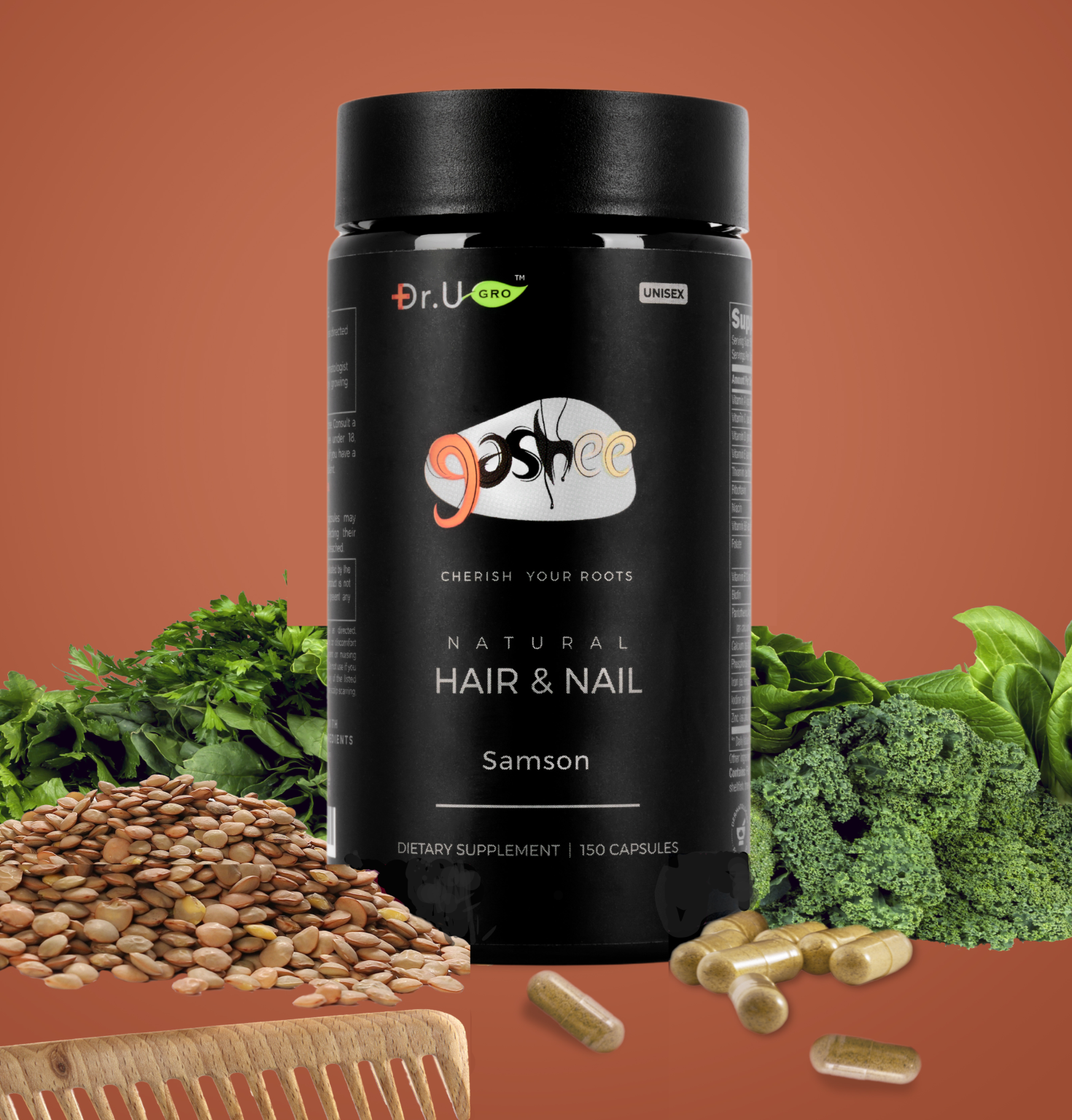What is Iodine?
Iodine is an essential mineral that is needed as part of our regular diet. Iodine is used and needed by the thyroid glands to produce thyroid hormones, which have many important responsibilities throughout the body such as proper bone and brain development during pregnancy and infancy. More so, because of iodine's direct relationship with the thyroid and hormone production, iodine can possibly help regulate, improve, or maintain healthy hair growth and hair health. Enough iodine supplementation is critical for everyone, particularly infants and pregnant women, but recent studies also show that enough iodine supplementation may also directly affect hair health and hair growth. Today, iodine supplements for hair loss, iodine on scalp for hair loss, and the benefits of iodine for hair are currently being researched, with some significant findings shown below.
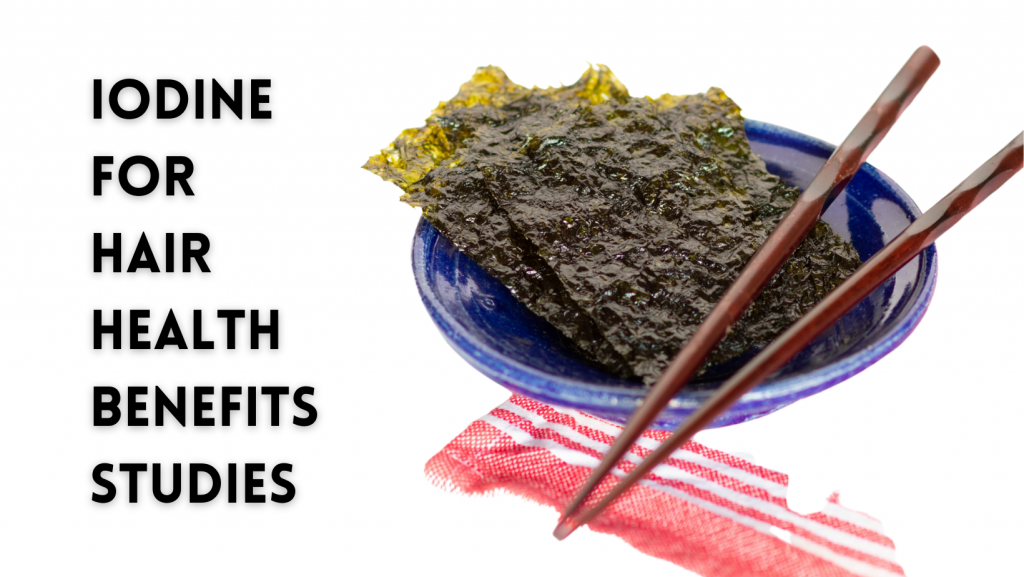 Iodine, found in seaweed, can help hair growth and hair health.
Iodine, found in seaweed, can help hair growth and hair health.
Iodine & The Thyroid: Health Benefits of Iodine Explained
Consuming enough iodine as part of your diet is critical for healthy and optimal thyroid function. As previously mentioned, the thyroid is important for hormone regulation, nervous system health, and more. Having too little or too much iodine in your body can lead to thyroid problems, which leads to problems in hormone production and hormone regulation, which can both affect hair health and hair growth.
Benefits of Iodine for Hair
As mentioned by Medical News Today, hypothyroidism, which is caused by too much or too little iodine, can lead to symptoms of hair weakness and hair loss. This is due to the thyroid's role in hormone production and hormone regulation, which contributes to the growth and maintenance of new cells within the body, including the scalp, hair follicle, and hair strands. In addition, Healthline also states how "thyroid hormones help control the growth of hair follicles," further supporting this claim. The same article and 2000 study state that "when thyroid hormone levels are low, hair follicles may stop regenerating. Over time, this may result in hair loss." This is why over time, some people with an iodine deficiency may eventually suffer from hair loss, hair thinning, or hair breakage. Another review published in 2014 also mentioned how in this study of 700 individuals, "30% of those with low thyroid hormone levels experienced hair loss."
Iodine on Scalp for Hair Loss
Additionally, iodine can also be added topically to the scalp to help prevent hair loss. Some of the benefits to hair when treating the scalp with iodine include:
- Help treat balding spots from hair loss
- Helps attack fungal infections that could be feeding on your hair follicles and weakening your hair
How to Use Iodine on Scalp to Fight Hair Loss
If you want to try to apply iodine topically to your scalp to help prevent hair loss, you can use regular, common table salt which is iodized in many countries. Just be sure to double-check that the label on the salt mentions "iodized." To apply iodine topically to your scalp, follow the recommended steps below:
- Wash hair, let it air dry
- Once hair and scalp are dry, apply table salt containing iodine to areas on scalp experiencing hair loss
- Gently massage salt into scalp to ensure maximum absorption
- If the table salt causes irritation on scalp, dilute the salt with a few tablespoons of water before applying
- Repeat process every day on the same areas for the most effective results
Additionally, you can apply iodine using table salt twice a day on areas that have significant hair loss to possibly enhance the effect.
Foods High in Iodine
In order to maintain optimum hair growth, hair health, and hair strength, it is important that we meet the daily requirement needs of iodine through our diets. Iodine can be found in many foods, particularly high in seaweed, dairy, tuna, shrimp, and eggs. Today, iodine is also found in common table salt, known as "iodized salt." For more foods high in iodine, take a look at the list below:
- SeaweedKombu Kelp (2000% DV)
- Wakame (44% DV)
- Nori (11-29% DV)
- Cod (42-66% DV)
- DairyMilk (59-112% DV)
- Yogurt (50% DV)
- Cottage Cheese
- Cheddar Cheese
- Iodized Salt
- Shrimp (23% DV)
- Tuna (11% DV)
- Eggs (16% DV)
- Lima Beans (10% DV)
- Prunes (9% DV)
- Out of all these options, seaweed, in particular, and depending on the type of seaweed, offers the highest concentration of iodine.
Iodine in Iodized Salt
It is interesting to note that currently, 88% of worldwide households use iodized salt. More so, in regards to iodized salt, it is important to note that not all salts are iodized - if you happen to substitute table iodized salt for sea salt, or Himalayan salt, for instance, these specialty salts are not always iodized. Be sure to check the product label to see whether or not the salt you are using is iodized or not. Additionally, processed foods, such as canned soups, almost never contain iodized salt. Although iodine is a critical mineral in our everyday lives, there are only a few select foods that are rich in iodine. Unlike other deficiencies, iodine deficiency is still a common deficiency in the modern and developed world because of this. For more information regarding foods high in iodine, visit Healthline's article here.
Is Excessive Iodine Consumption Safe?
To answer the question, excessive iodine consumption is "well-tolerated in the majority of people but could result in thyroid dysfunction for those who are susceptible." Therefore, if you are at risk of thyroid dysfunction, it may not be a good idea to eat kombu kelp, which has a very high concentration of iodine. Additionally, if you consume too much iodine at once it can lead to "short-term discomfort," with sensations of "burning of the mouth and stomach, fever, nausea, and diarrhea." More so, a long-term diet containing excessive iodine consumption can lead to damage to the body, including thyroid gland inflammation and thyroid cancer.
Maximum Recommended Intake of Iodine
According to Medical News Today, the maximum recommended intake of iodine is 1,100 mcg per day for all adults and 200 to 300 mcg per day for children up to the age of 8 years old.
Iodine Safety Profile
According to the EWG, iodine scores a 3 on the safety score sheet, which states that iodine poses no risk for cancer, developmental or reproductive toxicity, or allergies or immunotoxicity.
Iodine Recommended Dosage for Hair Health
According to Healthline, the recommended daily intake (RDI) of iodine is 150 mcg per day for most adults. For women who are pregnant or nursing, the requirements are slightly higher, with 220 mcg of iodine recommended daily for pregnant females, and 290 mcg of iodine recommended daily for nursing females. To put things into perspective, in the United States and Canada, one teaspoon of iodized salt contains 250 mcg of iodine, easily meeting the daily requirements for iodine.
Symptoms of Iodine Deficiency
If we do not have enough iodine in the body from our diet, iodine deficiency can manifest with symptoms such as:
- Swelling of Thyroid Gland
- Fatigue
- Muscle Weakness
- Weight Gain
- Hair Loss
- Dry, Flaky Skin
- Higher Sensitivity to Cold
- Trouble Learning & Remembering
It is important to note that about one-third of the human population is at risk for iodine deficiency, particularly those who live in areas with only a small amount of iodine in the soil, such as some European countries. More so the Thyroid is used to make thyroid hormones, which is critical to help control growth, repair damaged cells, and support a healthy metabolism - all factors associated with optimal hair growth and hair health. More so, there are also certain groups of individuals who are at higher risk of iodine deficiency:
- Pregnant Women
- People who live in countries with very little iodine in the soil, including South Asia, Southeast Asia, New Zealand, European Countries
- People who don't use iodized salt
- People who follow a vegetarian or vegan diet
Iodine Supplements for Hair
Iodine supplements are also available for hair growth or to optimize hair health. Before taking them, you should beware that there are potential side effects and interactions with medications - and that you should take dietary iodine supplements only under the supervision of a knowledgeable health care provider. Iodine supplementation is generally safe, although extremely high doses can cause upset stomachs.
Harness The Power of Iodine in Dr.UGro Natural GASHEE Oral Hair Supplements
Iodine, as well as other essential minerals, vitamins, and extracts essential to hair growth are among the many powerful plant-based ingredients found in Dr.UGro Gashee Oral Hair Supplements. Gashee Oral Supplements have been carefully formulated with the most effective dosage of iodine and other minerals and vitamins to help maximize effects on your hair growth and hair health. To help increase the feel and appearance of hair density, thickness, and volume, or to help regrow hair loss or aid hair growth, take 4 capsules a day.
VIDEO: Dr. UGro Gashee: Before & After Results of Iodine-Infused GASHEE
If you have had to deal with hair loss, or similar symptoms of deteriorating hair health, such as balding, receding hairline, thinning hair, or more, you understand that it is not an easy thing to deal with. As with all parts of our body and outer appearance, our hair makes up an important part of our identity. Fortunately, if you are going through these symptoms of hair loss, there is hope. There have been many success stories with Dr.UGro Gashee Hair Products where other products or medicines had failed to deliver results. One of these incredible real-life success stories is Ana. Here is her story.
Ana's Story: From Prevailing Against Cancer to Prevailing Against Hair Loss
Ana, a long-time California native, has a powerful story to tell. Having survived breast cancer almost over a year ago, life happened to throw another challenge at her. Although she underwent chemotherapy, Ana remarks that her hair has grown back, but the "texture and tone" of her hair had "considerably changed."
Symptoms of Hair Loss Ana Faced
- Thinning hair
- Hair loss
- Decrease in quality of hair texture
- Decrease in quality of hair tone
- Decrease in hair volume
Due to these symptoms of hair loss Ana faced, she was not able to grow her hair long without it breaking or falling away. This, in turn, also led to the decline in her hair volume, and the ability to build volume using her natural hair. The effects of these symptoms were so significant to her that she used to hide her "patchy hair" by wearing hats, hair scarves, headbands, and other accessories so that others would not see her hair. Finally, once she was up to this point, Ana knew that it was time to look for help. She tried many different doctors and pharmaceutical medications, recommendations, but none of them seemed to give her the results for her hair that she had desired. Yet, there seemed to still be hope for Ana. After several months of trial and error, trying different treatments that did not work, Ana's husband was able to find Dr.U's website and after exploring her options, decided to use Dr.U's natural and holistic plant-based GASHEE Products - to spectacular results.
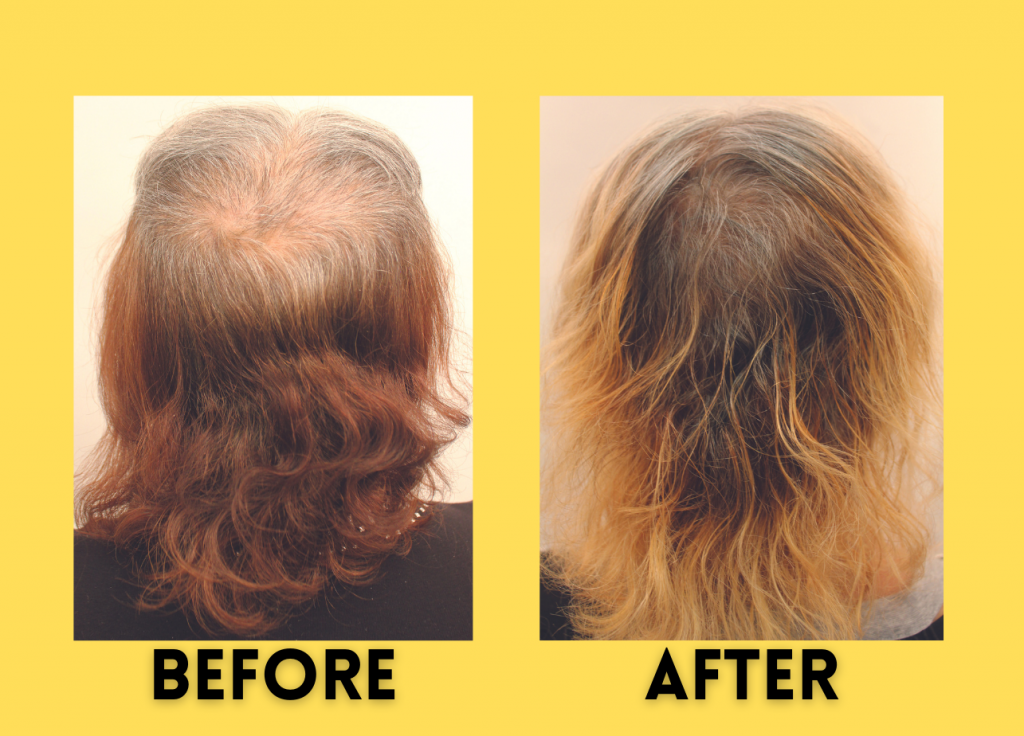
How Ana Turned It All Around: Natural Hair Health Results with GASHEE Products
It did not take long for GASHEE Products to show their results. Within 2 months' time, Ana was already seeing noticeable results and differences in her hair, which can be seen in the before and after picture results above, as well as the before and after video shown below. In short, Ana was speechless! The GASHEE Botanical Hair Topical Serum that she used was actually working. Where many other products and medicines did not work, GASHEE had helped Ana regain her shine and luster previously missing from her hair - with considerable growth in length and volume as well. Within a few months, Ana's hair had come back to life. See her results in the before and after video below:
Dr. UGro Gashee Oral Supplements Natural Hair Growth Results: Before and after several months of consistent usage. Note how after a few months of regular use, Ana was able to regrow much of her hair at considerable length and thickness, achieving an improved volume of hair that was not possible before. To see and learn more about other satisfied and happy Gashee Users, follow the link here.
What Can Iodine-Infused GASHEE Do For You?
Ana, and many others' success stories with GASHEE, and their hair health, can be yours too. If you are currently experiencing hair loss, or other symptoms associated with hair loss such as hair thinning, receding hairline, balding patches, or more, try Dr.UGro GASHEE Products now and see what natural plant-based power can do for you.
References
- Medicalnewstoday.com. 2021. Iodine: Health benefits and risks. [online] Available at: <https://www.medicalnewstoday.com/articles/288471#potential-health-risks> [Accessed 10 November 2021].
- Healthline. 2021. 10 Signs and Symptoms of Iodine Deficiency. [online] Available at: <https://www.healthline.com/nutrition/iodine-deficiency-symptoms#TOC_TITLE_HDR_5> [Accessed 10 November 2021].
- Messenger, A., 2021. Thyroid hormone and hair growth.
- Ods.od.nih.gov. 2021. Office of Dietary Supplements - Iodine. [online] Available at: <https://ods.od.nih.gov/factsheets/Iodine-Consumer/> [Accessed 10 November 2021].
- EWG. 2021. EWG Skin Deep® | What is PVP-IODINE. [online] Available at: <https://www.ewg.org/skindeep/ingredients/723153-PVPIODINE-PVPIODINE-PVPIODINE-PVPIODINE-PVPIODINE-PVPIODINE-PVPIODINE-PVPIODINE-PVPIODINE-PVPIODINE-PVPIODINE-PVPIODINE-PVPIODINE-PVPIODINE-PVPIODINE/> [Accessed 10 November 2021].
- Healthline. 2021. 9 Healthy Foods That Are Rich in Iodine. [online] Available at: <https://www.healthline.com/nutrition/iodine-rich-foods> [Accessed 10 November 2021].


